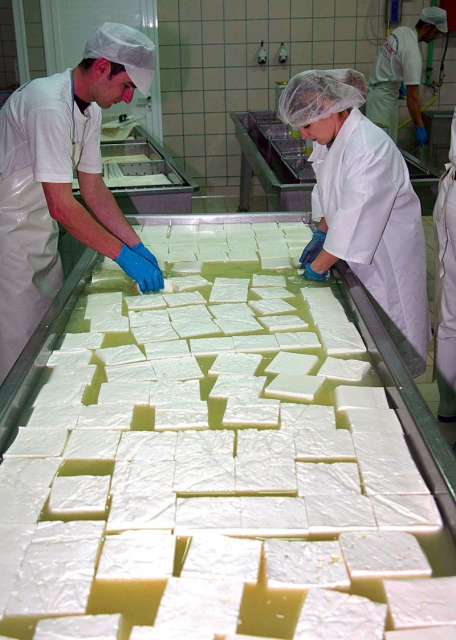Photo: imerisia.gr
An increase in demand for feta cheese abroad has been established by the union of breeders in Greece in the first half of this year. According to the data announced, the Ukraine consumed over 200% more Greek feta in 2012 compared to last year. There is increased demand in the United Arab Emirates (+108%), Ireland (+66%) and Australia (+60%). Total exports of feta in 2011 amounted to 34 thousand tons, which is a 3% increase compared to 2010. "The value of export of feta reached 182 million euro last year and profits rose by 2% compared with 2010, when the revenues amounted to 178 million euro," the chairman of the union Panagiotis Peveretos told Imerisia.
Around 40% of the exports of Greek feta cheese is focused on Germany, which remains the main  foreign market for local producers. Next is the United Kingdom with a market share of 14%, Italy with 12% and Sweden, Cyprus, Austria, USA, France, Switzerland, Belgium and Canada are considered important markets with prospects for growth. Feta represents between 70% and 76% of exports of dairy products.
foreign market for local producers. Next is the United Kingdom with a market share of 14%, Italy with 12% and Sweden, Cyprus, Austria, USA, France, Switzerland, Belgium and Canada are considered important markets with prospects for growth. Feta represents between 70% and 76% of exports of dairy products.
Despite the high interest in Greek feta abroad, the situation on the domestic market is not very favourable at present. After the strong growth in production between 2006 and 2009, the sector has declined in the last three years. The cost of unit production has increased significantly, which has led to the closure of many smaller dairies. Domestic consumption has also decreased with the deepening of the crisis. In 2010, a total of 102 thousand tons were produced whereas in 2011, the production fell to just over 92 thousand tons of feta.
"The significant drop in the production of feta is due to the fact that about 50 thousand tons less sheep's milk were produced last year," says Peveretos. He explains that the cost of production is due to the rising prices of animal food on international markets. Many farmers had to operate at a loss in order to maintain their farms and so, they have turned to other areas of agriculture. As a result, the decline in the total production of feta this year is expected to exceed 10% compared to 2011.
Today, manufacturers rely on the fact that the trend of buying local produce is increasing in Greece as well as on the opportunities provided by markets such as the Russian, Japanese, Indian and Chinese. These are countries with high economic growth and a market demand for high quality food with a geographical origin. Domestic producers insist that the state should exert stricter control on imports of white cheese from foreign countries, marking the origin of the product not only on the label but also on restaurant menus. Greece defends the name 'feta' as a purely Greek product and wants to distinguish it from other white cheeses produced outside the country.